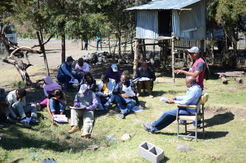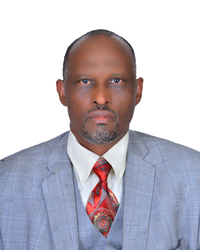
- IM4FS
In Africa, Ethiopia is second only to Nigeria as to population and arable lands. Although population is expected to double by 2030, there are ample margins for improving production, and food and nutrition security. Possible solutions come from a better understanding of the interactions between land resources, demography, climate change and innovative farming technology, often popularized with the term ‘climate smart agriculture’.

- Dr. Tomaso Ceccarelli
“The challenge of IMF4S is to promote agricultural innovations and ‘best practices’ in food insecure areas of the country. This is done with the support of data and IT solutions which can help in disseminating the best-fit innovations. What are the best crops to grow in a specific area ? Should this be facilitated by specific fertilizers, crop protection techniques, or rural infrastructures ? Are there additional risks associated to climate change or soil nutrient depletion which need the support of credit to farmers ? There are some questions the Project – IM4FS – is attempting to address,” say Dr. Tomaso Ceccarelli and Dr. Elias Eyasu Fantahun, co-leaders of the IM4FS Project, winner of the 2019 Olam Prize Prize for Innovation in Food Security.
IM4FS is a novel approach supporting the introduction of farming best practices in food insecure areas. It builds on the CASCAPE project (https://www.wur.nl/en/show/cascape-1.htm) which has successfully designed and implemented ‘best-fit’ combinations of crops, soils and innovative farming technologies. IM4FS aims to make these innovations work for many more farmers, in CASCAPE and other projects such as REALISE (https://benefitethiopia.org/). IM4FS looks first at what is needed to make such innovations a success. It then matches, in a given area, best farming practices with bio-physical, socio-economic resources and demography.
IM4FS wants to provide a tool for decision makers such as planners, researchers, agro-processors, extension specialists, financial institutions, as well as farmers, to simulate which interventions should be done where, and when. This is done by creating future scenarios.
Several of the about 80 ‘best-fit’ practices validated by CASCAPE have already been incorporated within the national/regional extension package. “The plan is to reach out over 750.000 smallholder farmers by 2019,” add Drs. Ceccarelli and Eyasu Fantahun.

- Dr. Elias Eyasu Fantahun
IMF4S will support this effort in generating substantial impacts in terms of food and nutrition security, at several levels. For instance, planners will be able decide more efficiently and timely on the provision of seeds of the preferred cultivars or appropriate fertilizers ; or on plans for the construction of feeder roads for opening up areas otherwise unreachable. Investors will be able to construct a processing plant in an area which can produce the raw material needed. Extension services would be able to better respond to farmers having a specific problem with soil or pests.
“Financial institutions will understand better the risk they face in promoting agricultural credit for a specific area and crop and design the best loans for farmers. Extension specialists and researchers at national level will work out better strategies to combat climate change, for instance identifying crop cultivars adapted to rising temperatures. Smallholder farmers will also have an advantage because the impacts above will help them coping with food insecurity also in face of climate change,” add Drs. Ceccarelli and Eyasu Fantahun.
Dr. Tomaso Ceccarelli is researcher at the Wageningen Environmental Research (WUR) ; Dr. Elias Eyasu Fantahun is professor at the Addis Ababa University.